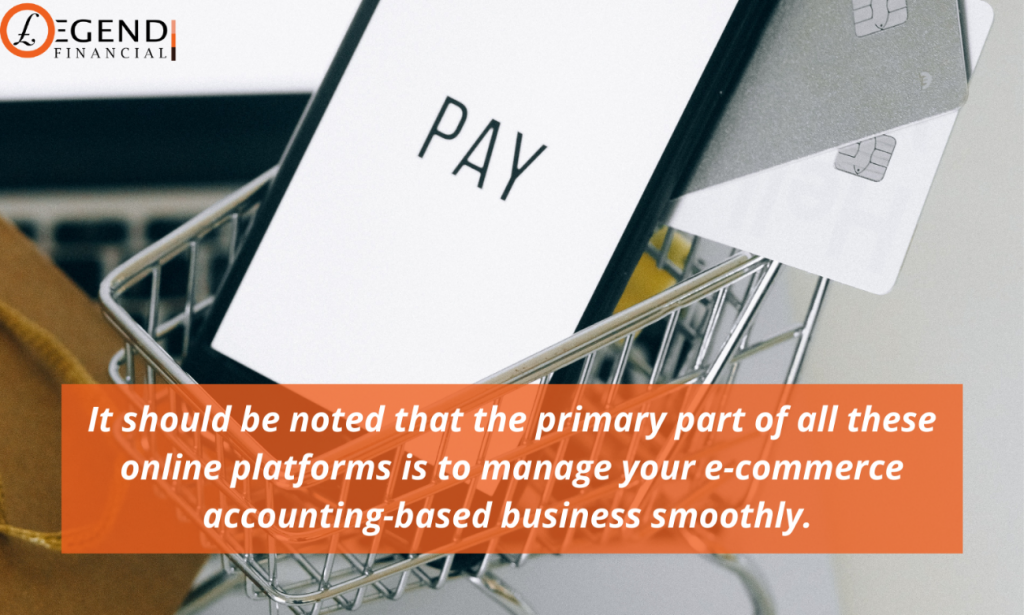One of the critical roles in the uprising of a business is its grip on e-commerce accounting principles. The main code is how data are managed and strategically executed to cut additional expenses. Let’s us disclose a secret to you; containing your e-commerce accounting is not child’s play.
In some cases, it proves to be a more tiring task, but at the end of the day, your finances are within your hand’s range. Managing it can be more stressful if it’s your very first turn to implement e-commerce accounting drops into your business.
A business is a man site on which a person depends on his financial needs. Managing such a company can be as challenging as it is essential to be addressed. The importance of both events cannot be neglected.
Handling assets, revenues, expenses, liabilities, loans, and sales can be seemed moving out of hands just like grains of sand when forced to remain in a clenched fist. It’s generally said that building up a business is an easy thing, but converting it into an established market requires the leading human resources.
Managing a business is related to your stress hormones and strength manifestation. But the main question is, even if it is an intense job, how are people around the globe are managing it. Not only managing but also excelling in the main field. How have they tackled all the hurdles and troubles related to their business management? And how are they striving to take their business to another level? The answer to all these questions can be summarized into a compound word: e-commerce accounting!
MANAGING TIPS
Some universal tips can be adopted to manage your running businesses through e-commerce accounting. Through this article, let’s have a deep insight into all aspects.
Keep Knowledge in your range
The first step regarding any business is Knowledge. Knowledge is related to laws and bylaws. But by incorporating e-commerce accounting into your business, you must know rules that are specially related to e-commerce accounting. For this purpose, you can visit the government’s official website and gain complete knowledge of it.
Tax advisors
On the other note, you must consult a tax advisor or a financial agent regarding your business outputs and inputs. It would be best if you had insights about the amount invested and taken out to maintain business. The tax is the main key point regarding legal outputs from your business account, which should be followed carefully.
Moreover, the tax should be reduced by incorporating the concept of accrual accounting. Therefore, a perfect tax planning is required in this regard, which can be adopted by taking the help of financial advisors.
Bookkeeping
Keeping your invoices, records, and other inputs in documents is the safest way to avoid any mishandling. The tax reclaims like VAT claim back is high related to the data published before. Keeping all the transactions with the proper entry of amount, date, and time will help your business in the long run. Bookkeeping generally means to jot down all the data regarding input and outputs and keep track of it. With the advancement of time, all this data can be transferred to an online platform where the data might not alter data.
Take Help of Online Platforms
You can scan your invoices, receipts, and other outputs and transfer the images to a google drive folder on your laptop or mobile phone. Placing documents on the cloud can be helpful in a way that allows you to access your document from anywhere, any time in the world. Accessing your data through an online platform can be very helpful during long business tours.
It will also make you tension-free from carrying your documents along with you. You can also record your business-related expenses and the rent of a furnished holiday that was opted for your business. After all, this also comes in your business-related expenses.
SOME ONLINE PLATFORMS
As already mentioned in the article, utilizing some basic online applications and software will help you access the data quickly and manage it chronologically. Some of the software and cloud-related applications are listed below.
Xero
Xero is a software that enables businesses related to small limited companies to grow faster by keeping an eye on all the transactions made under the company’s name. It is one of the best platforms that provide easy elucidations to your accounting-related issues enabling your company to have its steps established in the business world. An important aspect regarding Xero is that it allows for full-fledged security in terms of privacy. Your account is saved under many layers of passes so that it’s only you accessing it and not anyone else.
QuickBooks
QuickBooks is another platform related to e-commerce accounting, resolving your online problems. Data management, data organization, saving your data, and access of the main person are only some of the essential features of this software. You can also link your e-shop to the central QuickBooks platform.
In this way, data handling is done in a very précised way, eliminating all error aspects. QuickBooks offers different packages that you can select depending on the need and type of your running business.
There is much other software as well, lie wave and kashoo, that offers some additional functions compared to Xero or QuickBooks. But it should be noted that the primary part of all these online platforms is to manage your e-commerce accounting-based business smoothly. Business is a term that is closely related to transactions.
It’s just an in and out of money, and through ins, you make your profit. Trades and other jobs are a form of business, but this era is online trading, letting you profitably build money. Business management now cannot be thought without e-commerce accounting, and the best people are those who move with time. So invest in e-commerce accounting today and start knowing your numbers from today!




